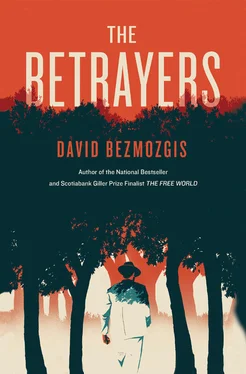Somewhere within Miriam this girl was cradled, and also the other Miriams who, through selflessness and loyalty, had enriched and solaced his life. He had wronged them individually and collectively, but they were now out of reach and he could not return to them even if he wished. And to the Miriam who had written the letter? Likely he could not return to her either.
Leora’s telephone conversation had ended before Kotler finished reading Miriam’s letter. Perceptive to the last, she didn’t disturb him but waited patiently for him to conclude.
— Something important? she asked.
— A letter from Miriam.
— Anything I should know?
— Nothing new, Kotler said as kindly as the words could be spoken. Other than some wisdom from Gedalia.
— And what is that?
—“For there is not a righteous man upon earth, that doeth good, and sinneth not.”
— He would know.
They did not pursue it further. They were of the same mind about Gedalia, though Kotler had reasons beyond those Leora could know. It was a young Gedalia, barely out of yeshiva, who had been Miriam’s chief advocate and protector. Her chaperone on her global crusade to free Kotler. There had been salacious murmurings, which had reached Kotler even in prison. In her letters, Miriam denied them, but not long after Kotler landed in Israel, Gedalia came to him, beating his breast, begging forgiveness, tearfully confessing to his impure thoughts and desires.
— I got our tickets changed, Leora said.
— Yes, I overheard. Thank you.
— No need to thank me, Baruch. It felt good to finally manage something. Even something so trivial.
Kotler looked at his watch. Half past nine. They had more than ten hours before their flight to Kiev. If they left now, they would be facing an inordinate wait at the Simferopol airport. It would be an inordinate wait in any airport, let alone Simferopol, which was not among the world’s coziest way stations.
— I suggest we go to Simferopol, Leora said. At the airport or the bus station we could stow our luggage and see the city. There must be something to see there.
— There must, Kotler said.
— What else would you propose? Leora asked.
— We’ll be the only tourists to leave Yalta without seeing the Livadia Palace, Chekhov’s house, or Massandra Beach.
— So you have a reason to come back, Leora said.
— No, Leoraleh, Kotler said. I have no reason to come back.
To reach the taxi stand they crossed Lenin Square for the last time. An accordionist, older than Kotler, a roostery fellow in a white baseball cap, had set himself up at the base of the statue. On the ground, lashed to a wheeled dolly, a stereo system piped an underscore of music. Next to the stereo sat an accordion case, open to receive contributions, a few bills and coins already scattered on its incompatibly lush blue velvet lining. The accordionist stood by the case and fingered the melody of a Russian folk song. A small audience formed a perimeter to listen to the music and watch the bolder among them dance. Kotler also slowed to watch, and Leora fell austerely in line beside him. On the impromptu dance floor, some dozen people spun. Kotler counted only one man among them, a youth with a shaved head who led his slim girlfriend by the hand. The rest of the dancers were older women. Some danced in pairs a short distance apart, stepping to the music. The others danced by themselves. They looked like ordinary embattled Russian women of Svetlana’s type briefly forgetting their arduous lives. Nearest to Kotler danced a woman in a flowered blouse and a long white skirt, her figure matronly, her hair auburn but gray at the roots, the skin of her face finely wrinkled. She held her head upturned, her shoulders level, her hands delicately twirling. She revolved in a small circle, her feet moving under the sweep of her skirt. On her feet, Kotler saw, she wore flesh-colored nylon socks and white leather, low-heeled shoes. With a blade she had cut the leather to make room for her bunions, which bulged almost monstrously through the rents.
Everywhere you look, heartbreak, Kotler thought.
At the taxi stand, cars were waiting. Kotler approached the first. Its driver sat inside, his window rolled down, reading a newspaper on the steering wheel.
— Will you take us to Simferopol? Kotler asked.
— And why not? the man replied. I’d take you to Kherson. The farther the better.
He named a fee and took charge of their bags while Kotler and Leora deposited themselves in the backseat, Leora turning to face the window, withdrawn into herself.
They drove along the same road they had taken before, this time heading out of Yalta. Morning traffic was heavy through the tourist center. Cars and buses lurched forward. Kotler gazed out the window at the view of sparkling, modernized Yalta. A resort town in a corrupt country, as it had always been, there to propagate the illusion. But he had loved it as a boy and believed his parents had loved it too. Now he would leave it for the last time and consign more of his life to the impervious past.
They picked up the main highway and drove through the Crimean countryside. They saw again the scenery they’d seen through the bus windows the previous day: the small towns and villages, visible from the road, little changed from fifty years earlier. They were ramshackle then; they were ramshackle still — though topped, here and there, by a satellite dish. Twice on the way to Yalta their bus had stopped to allow a herd of goats to cross the highway, their minder blithely leading them as though privileged by the antiquity of his trade. Sometimes they saw workers in the fields; sometimes men in the bones of a house engaged in some ongoing construction project. The pace of everything seemed governed by a bucolic torpor. It resembled, Kotler thought, Israel not so very long ago and, even to this day, the Arab parts of the country in the north and the south. The main difference was a peculiarity of the landscape, crude structures strewn haphazardly everywhere. Often they were just four walls without a roof. Or if with a roof, then with gaping holes for the windows and doors. All were of the same yellow limestone and could just as easily have been new and unfinished as old and decaying. But if they were old, Kotler didn’t remember them from before. The previous day, on the bus to Yalta, he’d turned to a young Russian man in the neighboring seat. Drily, the man informed him that these were the instruments of a Tatar land grab. After the fall of the Soviet Union, the Tatars had returned to Crimea in their thousands. The Ukrainian government, bowing to their historical grievances, had ceded them land wherever they built dwellings. These were supposed to be their dwellings.
Land! The land! What, Kotler had wondered, would his old Tatar prison mate have made of this? The repatriation and autonomy of the Crimean Tatars had been his struggle. He had given his life over to it. Were he still living, he and Kotler could have had an interesting conversation. What dreams they had nurtured and what distortions now obtained. And it was all to do with land. A measure of earth under your feet that you could call your own. Was there a more primitive concept? But nobody lives in the ether. Man is a physical being who requires physical space. And his nature is a prejudicial nature of alike and unalike. That was the history of the world. How much earth can you claim with another’s consent? How long can you hold it if you haven’t consent? And is it possible to foster consent where none exists? Kotler didn’t know the answers to the first two questions, but the essential question was the last, and the answer to that was not favorable.
— Imagine, Kotler said to Leora, this could have been the Jewish homeland. Then the Tatars and the Russians could have demanded we go back to where we belong, as the Palestinians do now.
Читать дальше












